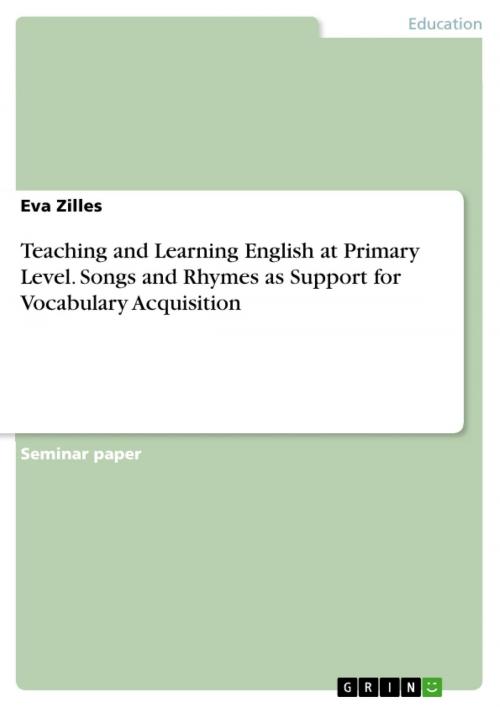Teaching and Learning English at Primary Level. Songs and Rhymes as Support for Vocabulary Acquisition
Nonfiction, Reference & Language, Study Aids, ESL, Foreign Languages| Author: | Eva Zilles | ISBN: | 9783668099319 |
| Publisher: | GRIN Publishing | Publication: | December 1, 2015 |
| Imprint: | GRIN Publishing | Language: | English |
| Author: | Eva Zilles |
| ISBN: | 9783668099319 |
| Publisher: | GRIN Publishing |
| Publication: | December 1, 2015 |
| Imprint: | GRIN Publishing |
| Language: | English |
Seminar paper from the year 2015 in the subject English - Pedagogy, Didactics, Literature Studies, grade: 1,7, University of Koblenz-Landau, language: English, abstract: Looking back, many adults remember school not only as a place and time of friendships and personal development but also as a time of boredom, restrictions and even fear. It does not take today's neurobiological knowledge of the brain to guess that a boring and fearful atmosphere is not the best learning environment. Instead, children1 should be taught in a way that is inspiring, fun and caring. A good opportunity for providing this type of teaching is through language classes in primary school. Some years ago, the governments of the German federal states decided to establish English as a first foreign language to be taught from as early as first grade. This enables English teachers to introduce children to the English language in a playful and natural way. Games, art activities, outdoor action and other activities can be combined with learning English. In addition, songs and rhymes can be used as age-appropriate teaching modules. This paper examines how songs and rhymes in primary school English classes support learning and focuses on vocabulary learning: Why and how is vocabulary taught? What is the role of songs and rhymes in teaching English? These two aspects will then lead to the main research question: How do songs and rhymes support vocabulary learning? The approach is to examine relevant literature on primary school education and English lessons with a focus on vocabulary learning and on songs and rhymes. According to the research concern, the paper first gives insight into vocabulary teaching (chapter 2). Next, it explores why and how songs and rhymes can be part of teaching English. Chapter 4 then examines songs and rhymes as a means of teaching vocabulary. The conclusion summarizes the findings concerning the research question. Should the paper arrive at the result that songs and rhymes are a motivating and inspiring way of learning vocabulary, it could be an encouraging message for teachers to apply that method.
Seminar paper from the year 2015 in the subject English - Pedagogy, Didactics, Literature Studies, grade: 1,7, University of Koblenz-Landau, language: English, abstract: Looking back, many adults remember school not only as a place and time of friendships and personal development but also as a time of boredom, restrictions and even fear. It does not take today's neurobiological knowledge of the brain to guess that a boring and fearful atmosphere is not the best learning environment. Instead, children1 should be taught in a way that is inspiring, fun and caring. A good opportunity for providing this type of teaching is through language classes in primary school. Some years ago, the governments of the German federal states decided to establish English as a first foreign language to be taught from as early as first grade. This enables English teachers to introduce children to the English language in a playful and natural way. Games, art activities, outdoor action and other activities can be combined with learning English. In addition, songs and rhymes can be used as age-appropriate teaching modules. This paper examines how songs and rhymes in primary school English classes support learning and focuses on vocabulary learning: Why and how is vocabulary taught? What is the role of songs and rhymes in teaching English? These two aspects will then lead to the main research question: How do songs and rhymes support vocabulary learning? The approach is to examine relevant literature on primary school education and English lessons with a focus on vocabulary learning and on songs and rhymes. According to the research concern, the paper first gives insight into vocabulary teaching (chapter 2). Next, it explores why and how songs and rhymes can be part of teaching English. Chapter 4 then examines songs and rhymes as a means of teaching vocabulary. The conclusion summarizes the findings concerning the research question. Should the paper arrive at the result that songs and rhymes are a motivating and inspiring way of learning vocabulary, it could be an encouraging message for teachers to apply that method.















